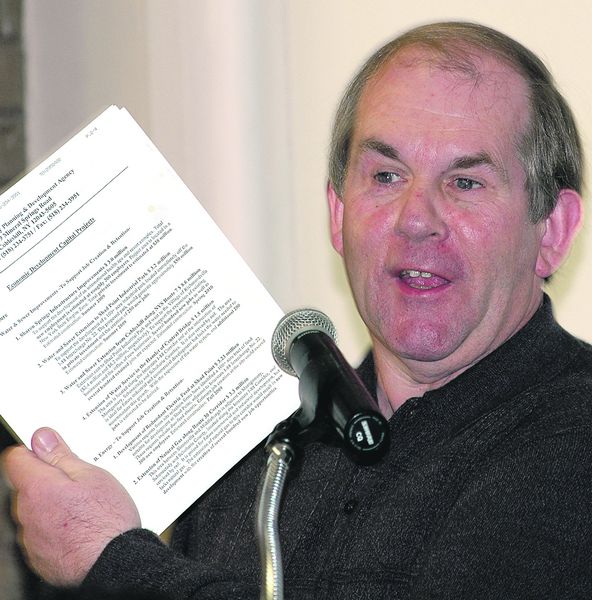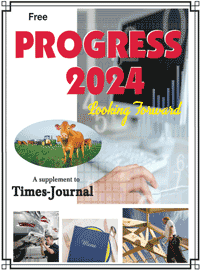Subscriptions
Menu
Advertisements
State of County: Better than many
3/18/2009 |
By Jim Poole |

The State of the County, a sort of tire-kicking check of how Schoharie County’s doing came down to this on Saturday:
We could use some help, but we’re better off than many. And with creativity and diligence, we can beat this recession––or at least lessen its impact.
The county Chamber of Commerce brought together a variety of speakers, from the federal level down to Main Street, for its annual examination of the county’s condition.
Speakers included Congressman Paul Tonko, state Senator Jim Seward, Assemblyman Pete Lopez, Board of Supervisors Chairman Earl Van Wormer, county Planning Director Alicia Terry, farmer Richard Ball and businessman Brian Kaiser.
All recognized the crippling effects of the recession, but all also acknowledged Schoharie County has the resources to weather it.
Major topics included what the county has, the federal stimulus money, reforming state government and focusing on the positive.
• • •
Agriculture may be Schoharie County’s ticket out of the recession.
Building on and marketing farming, along with developing infrastructure and small manufacturing, will spur the local economy, speakers stressed.
Ms. Terry and Mr. Ball emphasized the need for using the county’s agricultural base.
“We have the resources––land, location, proximity to markets,” Mr. Ball said. “We have so many raw ingredients to make our county self-sufficient.”
Although there’s a growing interest in buying local food, the county must do a better job marketing it, Mr. Ball added.
To improve, he said, the ag community needs vision, good habits and magic, which Mr. Ball described as “effort.”
“Schoharie County has much of what we need for the system,” he said. “This crisis is an opportunity for us.”
Ms. Terry agreed with Mr. Ball’s theme. The county should look to “adding value to our agricultural products”––in other words, adding processing and increased marketing.
“Rural America has what urban and suburban America wants––food, water, fuel and open space,” Ms. Terry said.
Turning to another subject, Ms. Terry said her Planning office, along with other officials, formed the Grow Team to discuss and work on economic projects and help businesses.
The county also offers “expertise for growing businesses,” a micro-loan program and training programs, Ms. Terry said.
She also pointed to five advantages the county has:
––A diversely talented work force.
––Innovation and ideas for new businesses.
––An economic base. “Right now, ours is a little slow, but we’re dealing with forces beyond our control,” Ms. Terry said.
––Entrepreneurship. “In this recession, people are forced to become more creative,” Ms. Terry said.
––Infrastructure.
Building on Ms. Terry’s topic, Mr. Van Wormer added another advantage.
“It’s all about the people,” he said. “We have a diverse group that’s well-educated, well-informed and has good work ethics.”
Mr. Van Wormer has pulled together such people in task forces that he’s formed to work on such varied issues as bringing a nursing home to the county, bringing broadband here, and energy development.
“The private sector and the public sector have to work together to move these things along,” Mr. Van Wormer said.
He also displayed a list of about 20 proposed improvements to infrastructure, ranging from new water service to new industries, that need both local and state backing.
“We need your help and your support,” Mr. Van Wormer said.
Finally, Ms. Terry added that adversity may bring out the best.
“When we face challenges, we can either fold or grow stronger,” she said. “Everyone in this county has the strength to overcome this soft economy.”
• • •
The federal stimulus money coming to New York will help in the short term, Congressman Tonko and Senator Seward said.
Assemblyman Lopez agreed but warned that we can’t develop a dependency on the stimulus package.
Of the billions coming to New York, $11 billion will go to Medicaid assistance relief, $3 to $4 billion is for education, and other funds will go towards infrastructure, energy and broadband, Congressman Tonko said.
“What I like is that it embraces technology,” he added. “The President’s vision––and I share it––is to get off our dependency of fossil fuels.”
Senator Seward said the stimulus money may soften the blow of Governor David Paterson’s proposed new taxes and fees.
As an aside, he took the opportunity to criticize Governor Paterson’s proposed budget.
“Raising taxes in the middle of an economic slowdown only digs the hole deeper,” Senator Seward said.
Back on the stimulus package, Senator Seward demanded that the money “goes for its intended purpose.”
Assemblyman Lopez admitted that the stimulus money is necessary, but it comes with a red flag.
The danger, he said, is that New York may come to depend on it. The key is realizing the stimulus is temporary––or should be, Assemblyman Lopez said.
“It’s like going to the dentist and getting a shot of Novocain and not treating the cause,” he said. “It feels better for a while, but you haven’t addressed the problem.”
• • •
What may help New York most in the long run, Assemblyman Lopez said, is reforming state government.
State officials mouth all the proper words about jumpstarting the economy but rarely put those words into action, he said.
“They say they’re creating jobs, but then they work in the opposite direction with new regulations, fees and taxes. They put a bar in front of growth.
“The real challenge is how do we change the way we operate?”
The public bears some responsibility for the state’s slide, Assemblyman Lopez said. The public has come to depend on state money and always expects more from the state.
“In our lifetime, we’ve never had to deal with scarcity,” Assemblyman Lopez said. “People come to Albany and want more. The reality is, this world is changing.”
The state––and the public––must break that cycle, he added. The state should be a helper, not an overbearing parent.
“The public sector needs to prime the pump and change the way we do business,” Assemblyman Lopez said. “And we need to get off our dependency of public money.
“We don’t wait for someone to hand something to us. We don’t work that way.”
Change in Albany must come, Senator Seward added. Reform should include a state spending cap, consolidation of state agencies and authorities and more emphasis on real job creation and economic development.
“And we need to maintain the Empire Zones. You’ll never fill that big building along I-88 without an Empire Zone,” Senator Seward said, referring to the still-vacant Guilford Mills building.
• • •
Concentrate on the immediate task at hand, accent the positive and try to ignore the negative: those bits of advice are from Brian Kaiser, on the front line in retail business.
Mr. Kaiser and his wife, Jacqui Hauser, recently opened The Studio for Art and Craft in Cobleskill. He joked Saturday about his apparent lack of experience in business, though he put in years in banking.
Besides creating a poor economic climate, the recession has also spawned fear, Mr. Kaiser said, and those in business must conquer––or at least control––their fear.
Some of that fear comes from the media’s constant recession coverage, he added.
“You have to tune out that noise in the background,” Mr. Kaiser said. “The fear has begun to feed on itself. You have to learn how to control it.”
As an example, he pointed to recent news that Schoharie County has an unemployment rate of 11.3 percent, the second-highest in the state.
The other side of that figure, Mr. Kaiser said, “is that 89 percent are still employed and not sitting at home watching TV and wringing their hands.”
He said business people must embrace two concepts: developing value in their products and prizing customer service.
“People gravitate towards value,” Mr. Kaiser said. “Value’s not the same as price; it’s the best product on the block.”
Customers also gravitate towards a business that serves them well, he said.
“Demonstrate every day that the customer’s needs are most important,” Mr. Kaiser said. “Under-promise and over-deliver.”
Mr. Kaiser is also president of Cobleskill Partnership Inc. and a board member of the Chamber’s Business Intervention Group, which offers advice to business people.
As such, he offered final advice:
“Seek guidance; networking with other business people can only help. And learn to be honest about your own shortcomings.”









